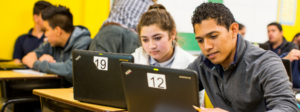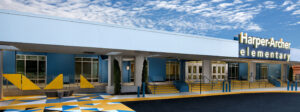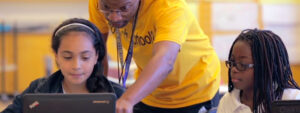One of the first things we like to tell people about Central Falls, Rhode Island is that we’re the smallest city in the smallest state. In just one square mile we have a bustling community of 22,000 people—we’re all close, literally and figuratively. We’re also 70% people of color—from a multitude of cultures and identities—making us the only majority-minority city in Rhode Island. Our diversity is our strength; it really helps to build our remarkable sense of community.
When COVID-19 came, we had to lean on that community more than ever before. Central Falls residents are your cashiers, your people at the manufacturing plant, your delivery drivers; working from home wasn’t an option for most of us. And so we were hit incredibly hard by the disease. This had a huge effect on our students—they were really suffering. Switching to virtual school is hard enough, but our students were particularly adrift. With so many parents working outside the home, students didn’t have any support for at-home learning. Many share rooms, and so didn’t even have the privacy to focus. Many others had to take care of siblings or other family members during the school day. We saw this show up in our data. Huge increases in chronic absenteeism, students doing poorly academically, and clear mental health struggles.
So we asked ourselves: what can we do to better support our kids?
Our first instinct, as it always is in Central Falls, is to look to the community. And what we realized is that there were so many adults who would gladly step up for our students. So, together with partner organizations Highlander Institute and Freedom Dreams, we put out the call, launching a pilot program of learning pods staffed by community members. We weren’t necessarily looking for folks with experience in education, or any particular credentials. We wanted pod leaders who had a connection to the community—raised here, currently live here, or work here—and wanted to make a difference for our kids.
Highlander Institute and Freedom Dreams designed culturally responsive curriculum to train up our pod leaders on key themes to support their students. Each pod leader works with a group of up to 6 students for up to 18 hours a week, either one-on-one or in small groups. We intentionally kept it flexible, because that’s what our students needed. Some of them have jobs or have to take care of a family member during the week so can only do weekends. Others are at high-risk for COVID and so are more comfortable meeting virtually. The idea is to meet students where they are. In the pod sessions, the pod leaders focus on four themes: academic mindset, building relationships, academic conversations, and post-secondary success. The pod leaders aren’t trained teachers, so they can’t replace core academic instruction. But as all educators know—and as has been particularly clear during the pandemic—there is more to being successful in school and beyond than core academic instruction.
And we’re proud to say that it’s working. Based on student surveys, grades, and attendance, the pods are really making a difference for our students. Parents and community members have told us repeatedly about the amazing progress they’re seeing—and how eager they are to help advocate for the program.
But the progress we’re seeing isn’t just about students—it’s about the growth of our community-based pod leaders themselves. From the beginning, we designed the program so that pod leaders could “level up” and improve their skills in a way that improved their own career prospects. A lot of the qualities that we look for in pod leaders—building relationships, problem solving, flexibility—are useful in so many other jobs. So we ask the pod leaders to name and work towards their own goals, and we do what we can to support them. One possibility we’re excited about down the road is creating a pipeline for pod leaders to work in schools, as classroom aides or even full-time teachers. It wouldn’t be easy, but there’s no question that we have untapped teaching talent in our community—and we owe it to our students to take advantage.
Hiring folks who don’t have education experience to help support our students may seem like a surprising idea. But for us in Central Falls, it makes perfect sense. Here, we support each other. We take care of each other. And we know that a person’s value to students is not just about the degrees or certifications they earn, but about what’s in their heart. All school system leaders would do well to remember that.
Central Falls School District is one of six grantees for our “learning hubs” initiative, supported by the Walton Family Foundation and the Michael & Susan Dell Foundation. Learn more here.






